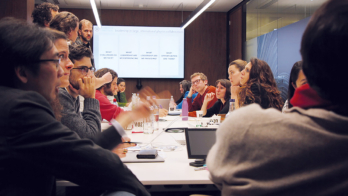Six secrets of successful institutes Mike Lazaridis, co-founder of the company behind the BlackBerry, explains how he has applied business strategy to establish a world-class theoretical-physics institute.
I started a company, Research In Motion, while I was still at the University of Waterloo in Ontario, Canada. By the late 1990s we had developed the BlackBerry handheld mobile device. As a result I found myself in a position where I could invest in an area that I am passionate about and one that could make a big difference.
Spot an opportunity. Having observed that research funding is usually thinly spread, I decided to start a theoretical-physics institute that would focus on science that is fundamental to all human progress and at which Canada can excel.

Promote scientific openness. My driving motivation for establishing the Perimeter Institute (PI), located next to the University of Waterloo, is that I feel fundamental science needs more support. What worries me is that governments all around the world seem to be listening to the same consultant. They ask scientists to do something that will benefit the economy within five years. Of course, governments are under pressure to balance budgets and be accountable – that’s reasonable. But some of that pressure is getting transferred to universities, with unfortunate results.
Science is a global enterprise based on co-operation and openness. If you say to universities that they must justify their research with patents and licences, you collapse that openness. Efforts to commercialize too early are making researchers more secretive, hampering their ability to excel, without necessarily helping business. I wanted to challenge this trend.
Concentrate on core competencies. A strategic decision we made when creating the Institute in 1999 was to focus on a couple of very specialized fields, quantum gravity and quantum foundations, because we felt these were areas where a relatively small, high-quality team could make a big difference. This is the same strategy that originally made BlackBerry a success: it focused on doing one thing – “push e-mail” – very well rather than competing on all features. So for the first few years, PI focused on recruiting top-class researchers in these two areas to ensure that research efforts were of international calibre within a relatively short period. As the Institute’s reputation builds, we are branching out a bit more.
Build a focal point. The other decision we made early on was to house the Institute in an outstanding building. Before we built it, we spent two years going around the world and talking to people in theoretical-physics institutes and theory departments at universities, asking them what works and what doesn’t. Based on this, we put together some specifications and organized a competition, where we really let the architects go wild. The result is a building with a design that has won several prizes and is internationally recognized.
Attract investment. I invested C$100 million of my own money in PI to get it started. For the longer term it was critical to get government support. Convincing government officials took a huge effort. Part of the challenge is that not many politicians understand basic science, let alone know how to value it. This means that a lot of funding is done almost entirely on your ability to explain the benefits and on their faith in you. Early on, all levels of government (local, provincial and federal) saw the benefit of PI and decided to support the Institute with a total of about C$55 million dollars. More recently, and now that the Institute is established, a further C$50 million in public investment was warmly received.
Present your product. In the long run, you can’t rely on faith alone. So although excellent science is crucial to success that’s really only half of the story. The other half of the Institute’s activities is about outreach. For example, PI has a summer-school programme for students from all over Canada and around the world. PI also goes on tour across Canada to give classroom instruction about physics to both students and teachers.
PI also has a programme of monthly public lectures. Sometimes we’ll have scientists like Roger Penrose discuss a weighty topic; other times we’ll have debates about science with well-known historians and journalists. Waterloo has a population of only about 100,000, yet every month we fill a 550 seat lecture theatre, and there’s always a queue outside on standby. That’s how much interest you can generate in science, if you make the effort to open it up for people and make the research accessible.
And that’s success. Because ultimately, these are the people who vote for the governments which fund the research. If they don’t benefit from and believe in what we’re doing, it’s always going to be an uphill struggle. So in addition to directly helping students, teachers and members of the general public, there’s reason for balancing good science with good outreach. We have to move beyond relying on faith.
Mike Lazaridis is founder and co-CEO of Research In Motion, makers of BlackBerry handheld devices, as well as chancellor of the University of Waterloo. Additional information about PI is available at
www.perimeterinstitute.ca.





